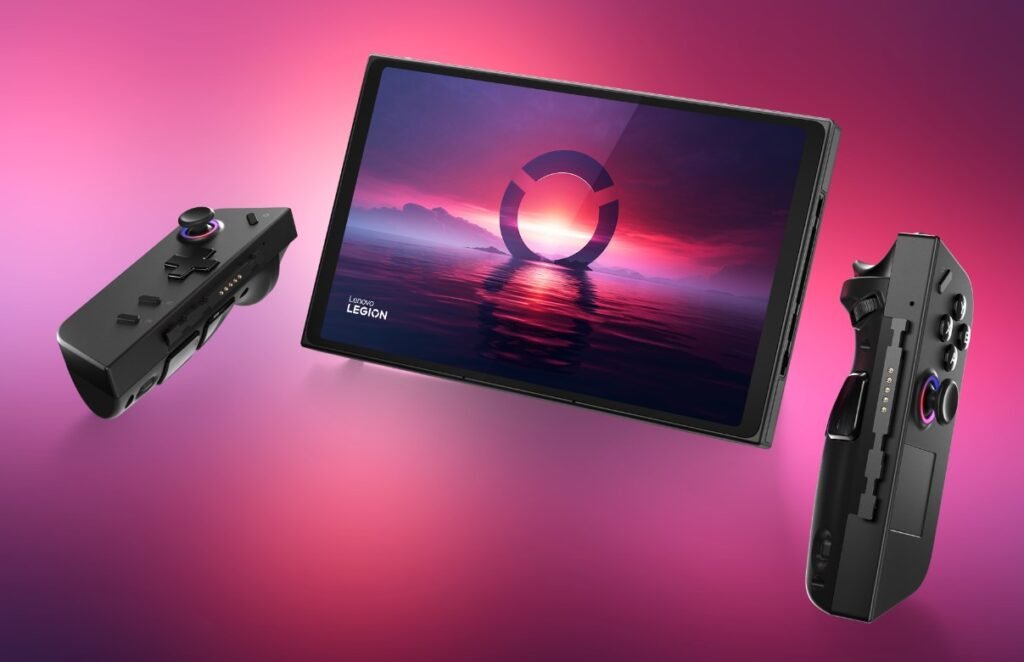Lenovo has recently unveiled its new handheld gaming device, the Legion Go, which aims to compete with the likes of Valve’s Steam Deck and Asus’ ROG Ally. The Legion Go is a Windows 11-based machine that boasts a large 8.8-inch QHD display, detachable controllers, and a powerful AMD Ryzen Z1 Extreme processor. But what sets it apart from its rivals is a feature that could make it the best gaming handheld ever: a user-friendly game launcher.
Legion Space: A game launcher designed for the handheld
One of the main advantages of the Steam Deck over other handheld gaming PCs is its dedicated game launcher, SteamOS, which provides a console-like experience and seamless compatibility with Steam games. The Asus ROG Ally and the AyaNeo 2S, on the other hand, rely on Windows 11 and their own game launchers, which are not always optimized for the handheld form factor and may require leaving the launchers to boot up some games.

The Legion Go aims to solve this problem with its own game launcher, called Legion Space, which is specifically designed for the handheld device. Lenovo says that Legion Space lets you quickly access all your game platforms and stores, view installed games, purchase games through the Legion Game Store, and adjust settings like resolution, refresh rate, brightness, and more. You can also group all your supported game launchers together in Legion Space so you can dive directly into a game without hassle.
If Legion Space can deliver on its promises, it could rival SteamOS in terms of efficiency and user-friendliness, and give the Legion Go an edge over its Windows 11-based competitors.
Detachable controllers: A Nintendo Switch-inspired feature
Another unique feature of the Legion Go is its detachable controllers, which are reminiscent of the Nintendo Switch’s Joy-Cons. You can pull off each side of the Legion Go and use them remotely as Bluetooth controllers, or attach them back to the device for a more traditional handheld experience. The controllers also have customizable RGB lighting under the analog sticks, which adds some flair to the device.
The detachable controllers could offer more versatility and comfort for gamers who want to play on a bigger screen or in different positions. However, they also add some complexity to the device, as you need to press a button on the back of each controller to unlock it before pulling it off. The controllers also have their own batteries that need to be charged separately from the device.
A powerful handheld with a premium price
The Legion Go is not only impressive in terms of features, but also in terms of performance. It has an AMD Ryzen Z1 Extreme processor with RDNA graphics, which is more powerful than the Steam Deck’s AMD Zen 2 CPU with RDNA 2 GPU. It also has 16GB of LPDDR5X RAM and up to 1TB of PCIe 4.0 NVMe SSD storage. The device also supports USB-C 4.0 with DisplayPort and PD, a 3.5mm headphone jack, and a microSD card slot.
The Legion Go’s display is also larger and sharper than the Steam Deck’s 7-inch HD screen. The Legion Go has an 8.8-inch QHD IPS touchscreen with a 16:10 aspect ratio, a 144Hz refresh rate, 500 nits of brightness, and 97% DCI-P3 color gamut. The display also supports HDR10 and Dolby Vision for enhanced visuals.
However, all these features come at a cost. The Legion Go starts at $699 for the base model with 256GB of storage, which is $200 more than the Steam Deck’s base model with 64GB of eMMC storage. The Legion Go’s higher-end models with 512GB and 1TB of SSD storage are priced at $899 and $1,099 respectively, which are significantly more expensive than the Steam Deck’s equivalent models with 256GB and 512GB of SSD storage ($529 and $649 respectively).
The Legion Go also has a smaller battery than the Steam Deck. The Legion Go has a 2-cell 49.2WHr battery that supports Super Rapid Charge, while the Steam Deck has a 3-cell 40WHr battery that supports Fast Charge. Lenovo claims that the Legion Go can last up to six hours on a single charge depending on usage, while Valve estimates that the Steam Deck can last between two to eight hours.
A promising contender in the handheld gaming market
The Lenovo Legion Go is a promising contender in the handheld gaming market, as it offers some unique features that could make it stand out from its rivals. The device’s user-friendly game launcher, detachable controllers, large QHD display, and powerful processor are all appealing factors for gamers who want a portable PC gaming experience.
However, the device also faces some challenges, such as its higher price tag, smaller battery capacity, and potential compatibility issues with some Windows 11 games. It remains to be seen how well the device will perform in the real world, and how it will compare to the Steam Deck and the ROG Ally in terms of user satisfaction and sales.
The Legion Go is expected to launch in early 2023, while the Steam Deck is slated to ship in December 2023 and the ROG Ally is already available for pre-order. Gamers who are interested in getting a handheld gaming PC will have plenty of options to choose from, but they will also have to weigh the pros and cons of each device carefully.
